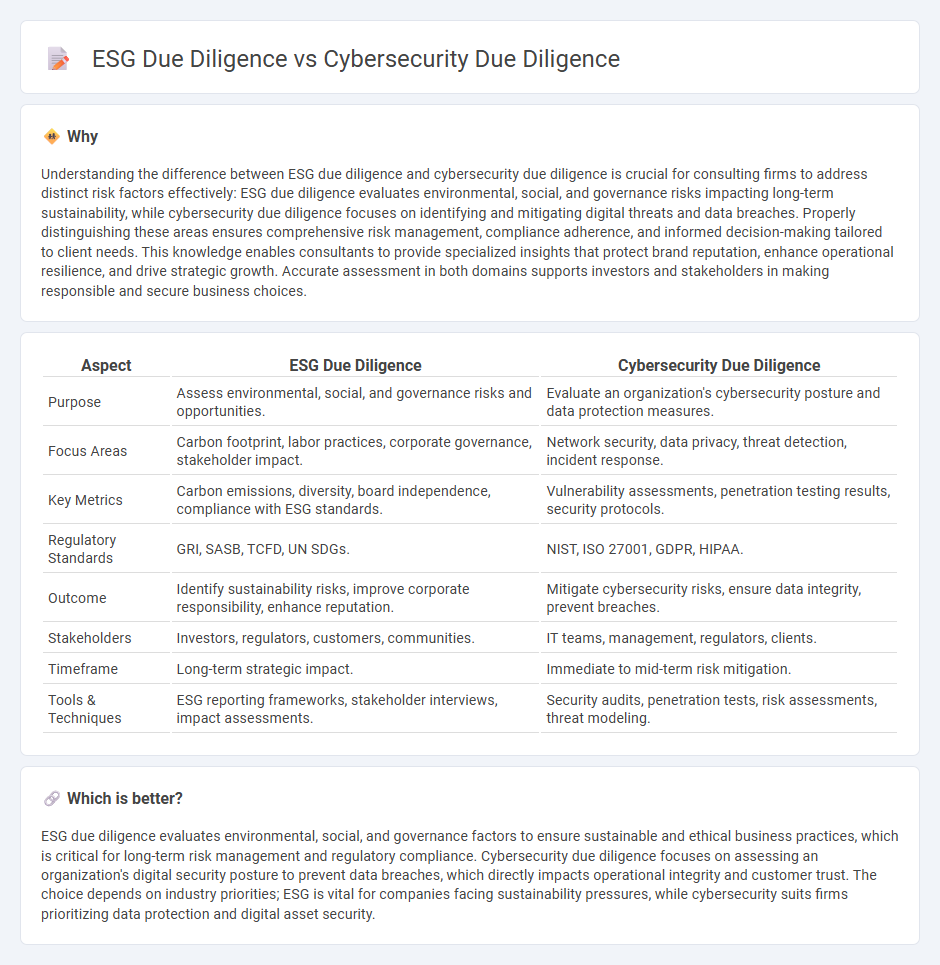
ESG due diligence assesses environmental, social, and governance factors to ensure responsible investment and sustainable business practices, focusing on compliance with regulatory standards and ethical impact. Cybersecurity due diligence evaluates an organization's information technology infrastructure, identifying vulnerabilities and risks related to data protection, cyber threats, and operational continuity. Explore how integrating ESG and cybersecurity due diligence can protect value and promote resilience in your business.
Why it is important
Understanding the difference between ESG due diligence and cybersecurity due diligence is crucial for consulting firms to address distinct risk factors effectively: ESG due diligence evaluates environmental, social, and governance risks impacting long-term sustainability, while cybersecurity due diligence focuses on identifying and mitigating digital threats and data breaches. Properly distinguishing these areas ensures comprehensive risk management, compliance adherence, and informed decision-making tailored to client needs. This knowledge enables consultants to provide specialized insights that protect brand reputation, enhance operational resilience, and drive strategic growth. Accurate assessment in both domains supports investors and stakeholders in making responsible and secure business choices.
Comparison Table
| Aspect | ESG Due Diligence | Cybersecurity Due Diligence |
|---|---|---|
| Purpose | Assess environmental, social, and governance risks and opportunities. | Evaluate an organization's cybersecurity posture and data protection measures. |
| Focus Areas | Carbon footprint, labor practices, corporate governance, stakeholder impact. | Network security, data privacy, threat detection, incident response. |
| Key Metrics | Carbon emissions, diversity, board independence, compliance with ESG standards. | Vulnerability assessments, penetration testing results, security protocols. |
| Regulatory Standards | GRI, SASB, TCFD, UN SDGs. | NIST, ISO 27001, GDPR, HIPAA. |
| Outcome | Identify sustainability risks, improve corporate responsibility, enhance reputation. | Mitigate cybersecurity risks, ensure data integrity, prevent breaches. |
| Stakeholders | Investors, regulators, customers, communities. | IT teams, management, regulators, clients. |
| Timeframe | Long-term strategic impact. | Immediate to mid-term risk mitigation. |
| Tools & Techniques | ESG reporting frameworks, stakeholder interviews, impact assessments. | Security audits, penetration tests, risk assessments, threat modeling. |
Which is better?
ESG due diligence evaluates environmental, social, and governance factors to ensure sustainable and ethical business practices, which is critical for long-term risk management and regulatory compliance. Cybersecurity due diligence focuses on assessing an organization's digital security posture to prevent data breaches, which directly impacts operational integrity and customer trust. The choice depends on industry priorities; ESG is vital for companies facing sustainability pressures, while cybersecurity suits firms prioritizing data protection and digital asset security.
Connection
ESG due diligence and cybersecurity due diligence are interconnected through their shared focus on risk management and sustainability within corporate governance. ESG assessments increasingly emphasize data privacy, security protocols, and cyber risk mitigation as critical factors impacting environmental, social, and governance performance. Integrating cybersecurity due diligence into ESG frameworks ensures comprehensive evaluation of vulnerabilities that could affect reputation, regulatory compliance, and long-term business resilience.
Key Terms
Risk Assessment
Cybersecurity due diligence emphasizes identifying vulnerabilities, threats, and potential data breaches to minimize operational risks and protect sensitive information. ESG due diligence prioritizes evaluating environmental, social, and governance risks that impact long-term sustainability and regulatory compliance. Explore comprehensive strategies to integrate both frameworks effectively for robust risk assessment.
Compliance Frameworks
Cybersecurity due diligence centers on assessing an organization's information security measures, data protection policies, and adherence to regulatory frameworks like GDPR and NIST standards. ESG due diligence evaluates environmental, social, and governance criteria, emphasizing regulatory compliance related to sustainability reporting standards such as SASB and TCFD. Discover how integrating both compliance frameworks ensures comprehensive risk management and regulatory alignment.
Data Privacy (Cybersecurity) vs. Sustainability Standards (ESG)
Cybersecurity due diligence prioritizes data privacy by assessing an organization's protocols for protecting sensitive information against breaches and ensuring compliance with regulations such as GDPR and CCPA. ESG due diligence centers on sustainability standards, evaluating environmental impact, social responsibility, and governance practices to drive long-term ethical and operational success. Explore how integrating robust data privacy measures and sustainability criteria can enhance overall due diligence efficacy.
Source and External Links
Cybersecurity Due Diligence: A Practical Guide - Kroll - Cybersecurity due diligence involves assessing key security controls, policies, compliance, incident response, and risk management frameworks to identify vulnerabilities, breaches, and compliance gaps before transactions such as M&A.
Cybersecurity Due Diligence: Steps to Conduct - Sprinto - The process includes performing a risk profile of the target business, understanding legal and regulatory standing, evaluating vendor relationships, and investigating past cyber incidents and data ownership.
Top 5 Cybersecurity Due Diligence Best Practices - Wipfli LLP - Best practices include comprehensive risk management assessments that verify protective controls, incident detection and response capabilities, secure backups, and readiness to mitigate cyber threats effectively.
 dowidth.com
dowidth.com